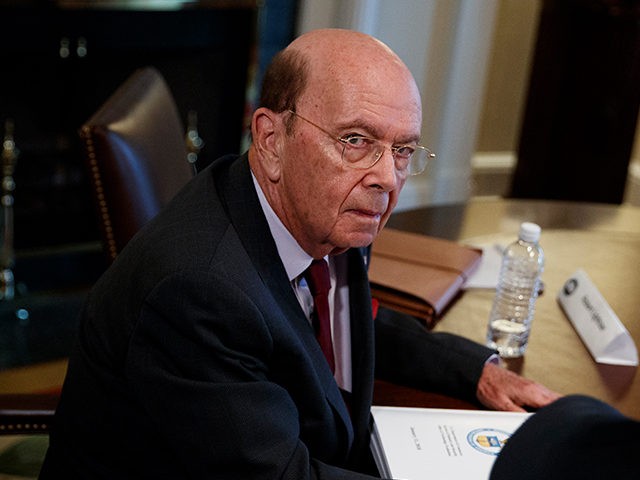Commerce Secretary Wilbur Ross’ conflicts of interests may complicate his ability to negotiate international trade policy, according to a new report from the Government Accountability Institute.
Ross has not fully divested his investments in shipping companies whose activities potentially place them right in the crosshairs of President Trump’s threats to impose tariffs on foreign goods, particularly steel and aluminum.
GAI’s research found that since 2016, 62 percent of the imports carried into the U.S. by one company linked to Ross originated from South Korea, mostly steel and steel products. South Korea’s government recently obtained an exemption from the Trump administration’s tariffs on steel and aluminum, an exemption Ross played a key role in negotiating.
When Ross left his successful investment firm in early 2017 to join the administration, ethics officials allowed him to retain his large holdings in a number of companies involved in international shipping. One of these firms, Nautical Bulk Holdings, Ltd., specializes in the transport of commodities. Records show that more than 62 percent of the 1,400 shipments carried by Nautical Bulk’s ships since 2016 came from South Korea. The vast majority of those shipments were of steel or steel products. These goods would have been subject to a 25 percent tariff without a tariff exemption South Korea negotiated with the Commerce Department. As part of the deal, South Korea has agreed to a voluntarily limit on steel exports to the U.S.
While Ross’s financial disclosure does not name Nautical Bulk Holdings as an underlying asset of any of his current investments, it does list offshore entities used to handle his firm’s joint ventures with the two investment firms which partnered with Ross in Nautical Bulk, suggesting an ongoing tie to the firm. Ross’s chief of staff at the Commerce Department, Wendy Teramoto, served on Nautical Bulk’s board until July 2017 despite joining the Commerce Department in months earlier, and is still listed as a director of at least one of the firm’s subsidiaries. Teramoto previously worked with Ross at WL Ross & Company, which first invested in Nautical Bulk Holdings in 2013.
Ross has come under fire before for his involvement with Navigator Holdings and Diamond S Shipping, two companies which specialize in shipping oil and natural gas. According to his ethics agreement, Ross kept these investments even after his confirmation. Along with Nautical Bulk, Wendy Teramoto stayed on both their boards until summer 2017. Their clients include domestic and international energy firms, as well as financial firms which could potentially benefit from inside knowledge of trade policy.
Records show that, since early 2016, Diamond S has handled shipments for Gazprom and Novatek, two Russian energy firms currently subject to U.S. sanctions, as well as the Venezuelan state-owned oil giant PDVSA. Diamond S reported to the SEC in 2014 that WL Ross & Company owned 32 percent, while the Chinese state-owned Chengdong Investment Corporation owned more than 8 percent, making it the company’s third largest shareholder. Details of the company’s ownership since then have not been publicly disclosed, but Ross served as chairman of Diamond S until he became Commerce Secretary in March 2017.
A spokesman for the Commerce Department claimed Ross had divested from Diamond S and Navigator Holdings last December, but no such transaction has been reported to the Office of Government Ethics.
The trade policies being negotiated by the Commerce Department will continue generate fierce debate, but it is clear that government officials should not be allowed to work both sides of the table. The point of ethics laws is to reduce potential conflicts of interest. Instead, ethics officials appear to have helped a figure in power maintain and conceal his private interests through a complex corporate web. While businessmen like Ross, a major figure in finance with decades of experience, are logical choices for government positions, they must separate themselves from their private holdings when they enter public service. Ethics officials are supposed to enforce these rules, instead they seem to have looked the other way.
When asked for comment on this article, a Commerce Department spokesperson reiterated that Secretary Ross is in full compliance with federal regulations, including his agreement with the Office of Government Ethics.

COMMENTS
Please let us know if you're having issues with commenting.